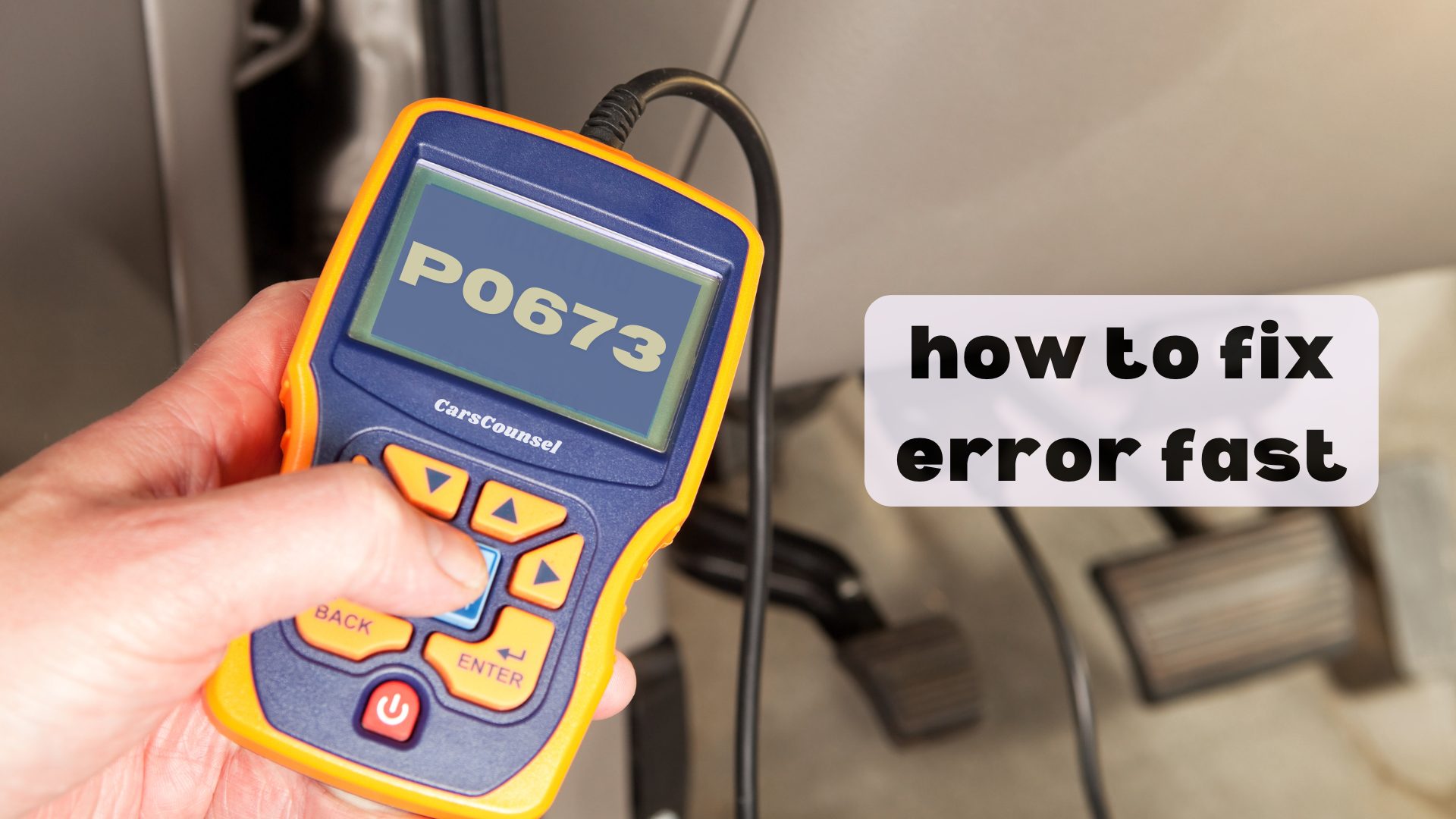Imagine your engine as a symphony orchestra, with each part playing an essential role in harmony.
Now, picture a glow plug failing, causing a jarring note. The P0673 code tells you there’s a problem with the glow plug circuit in cylinder 3.
If you ignore it, your engine’s performance can suffer.
To fix it quickly, you’ll need an OBD-II scanner to confirm the OBD2 error, then inspect the glow plugs and wiring.
Want to know the best way to diagnose and fix this issue? Follow these steps.

Quick Navigation
Key Takeaways
- Replace the bad glow plug: Change the faulty glow plug in cylinder 3 to ensure the engine heats up properly.
- Check the glow plug relay: Look at the glow plug relay and replace it if it’s not working right.
- Inspect the wiring and connectors: Check for and fix any broken or rusty wires and connectors in the glow plug circuit.
- Test and replace any blown fuses: Check the fuse box and change any fuses that are blown and affecting the glow plug system.
What Is the P0673 Code?
The P0673 code means there’s a problem with the glow plug control circuit for cylinder number 3. This circuit is crucial for heating the combustion chamber in diesel engines, especially in cold weather.
There are different types of glow plugs, like metal-rod and ceramic, that help your diesel engine run smoothly. If this circuit isn’t working, your engine might have trouble starting when it’s cold.
The P0673 code is part of the OBD-II system, which helps keep your engine running efficiently by catching issues early. Fixing this code quickly ensures your diesel engine stays reliable and efficient.
Regular maintenance and knowing about the different types of glow plugs can help prevent these problems, keeping your engine in top shape.
Importance of Glow Plugs
Understanding the P0673 code helps us see why glow plugs are so important for your diesel engine. These plugs warm up the combustion chambers, which is especially important in cold weather. Taking care of your glow plugs can greatly impact how well your engine works. Here’s why:
- Easier Starts: Ensures the engine starts more easily in cold weather.
- Better Fuel Efficiency: Helps the engine burn fuel more efficiently, using less fuel.
- Lower Emissions: Reduces white smoke and harmful emissions by ensuring fuel burns completely.
- Longer Engine Life: Keeps the engine running smoothly and puts less strain on its parts.
Keeping your glow plugs in good condition helps you avoid problems like hard starts, misfires, and poor fuel economy, making sure your diesel engine runs reliably.
Common Causes of P0673
Common causes of the P0673 code in diesel engines include faulty parts, electrical problems, and general wear and tear.
Often, a bad glow plug or relay messes up the preheating process. Different types of glow plugs, like ceramic or metal, can fail because they’re old or because the diesel engine hasn’t been well-maintained.
Electrical issues like blown fuses, bad wiring, or rusty connections can also mess with the glow plug control circuit. Regular maintenance helps catch these problems early, stopping bigger engine issues before they start.
Wear and tear, like worn-out battery terminals or an old engine control module (ECM), also contribute to the P0673 code. Keeping up with diesel engine maintenance is key to avoiding these common issues.
Identifying Faulty Components
First, use an OBD-II scanner to check for the P0673 code and make sure you’re dealing with a problem in the glow plug control circuit.
Then, follow these steps to find and fix any faulty parts:
- Check the Glow Plugs: Inspect each glow plug for any physical damage or excessive wear as part of regular maintenance.
- Test Resistance: Use a multimeter to measure the resistance of the glow plugs. If the resistance isn’t what it should be, the glow plug is likely faulty.
- Check the Relay: Use a multimeter to test the glow plug relay and ensure it’s working properly.
- Look for Problems: Visually inspect the glow plug circuit for any signs of corrosion, damage, or loose connections.
Checking for Electrical Failures
When checking for electrical problems, start by looking at the fuse box to see if any fuses are blown, which might stop the glow plugs from working. Next, look at the wiring to see if there are any signs of damage or rust. Use a multimeter to check if the circuits are connected properly, making sure there are no breaks or short circuits that could cause issues. Pay special attention to connectors and terminals because bad connections can mess up the electrical flow.
| Step | Action |
|---|---|
| 1 | Look at the fuse box for blown fuses |
| 2 | Check the wiring for damage or rust |
| 3 | Use a multimeter to check circuit connections |
| 4 | Look at connectors and terminals |
| 5 | Make sure there are no breaks or short circuits |
Recognizing General Wear
Recognizing General Wear
Parts of your car, like the glow plugs, can wear out over time and stop working well. Regular maintenance can help these parts last longer. Here are some signs that parts might need attention:
- Rusty Connections: Look for rust on battery terminals and connectors.
- Old Glow Plugs: Glow plugs can become less effective over time, causing engine problems.
- Worn Wiring: Old wiring can get brittle or damaged, which messes up the electrical flow.
- Tired Components: Parts like the glow plug relay can wear out from age and use.
Symptoms to Watch For
Watch for signs that your diesel engine might have a problem, like the P0673 code.
If it’s hard to start the engine, especially when it’s cold, or if you notice more smoke from the exhaust, engine misfires, or worse fuel efficiency, these are red flags.
A check engine light that stays on is also a big clue.
These symptoms mean the glow plugs might need attention.
Fixing these issues quickly can prevent bigger problems and keep your vehicle running well.
Regular checks can catch problems early, so you can get them fixed before they become serious.
Using an OBD-II Scanner
To figure out the P0673 code, you’ll need to use an OBD-II scanner. This device helps you read and clear trouble codes from your car.
Here’s how to do it:
- Hook Up the Scanner: Find the diagnostic port, usually under the dashboard, and plug in the scanner.
- Check the Codes: Turn on the scanner and choose the option to read the codes. Make sure you see the P0673 code.
- Look at the Data: Use the scanner to check the live data for the glow plug control circuit.
- Clear the Codes: Once you’ve made the necessary repairs, use the scanner to clear the code and reset the system.
Using this method makes troubleshooting straightforward and effective.
Visual and Multimeter Inspections
To find out what’s causing the P0673 code, start by taking a good look at the glow plugs and their parts.
Look for any damage or rust on the glow plugs. Check the wires and connections to see if they’re worn out, frayed, or rusty.
After that, use a multimeter to test the resistance of each glow plug; a working glow plug usually has a resistance between 0.5 and 2 ohms.
Also, check the glow plug relay and fuses to make sure they’re working right.
If you get readings outside these ranges, you likely have faulty parts that need to be replaced.
Steps to Fix P0673
After confirming the P0673 code through visual checks and using a multimeter, you should start by replacing any faulty glow plugs and relays. Proper glow plug maintenance is key to getting your engine running smoothly again.
Follow these steps:
- Replace Faulty Glow Plugs: Put in new glow plugs to ensure the combustion chambers heat up properly.
- Check and Replace Relays: Look at the glow plug relay and replace it if it’s not working to keep the electrical flow steady.
- Repair Wiring: Fix any damaged or corroded wires in the glow plug circuit to avoid electrical problems.
- Replace Blown Fuses: Change any blown fuses that might be messing with the glow plug system.
These steps will help you quickly fix the P0673 code and improve your engine’s performance.
More OBD-II Codes
Frequently Asked Questions
How Much Does It Typically Cost to Fix the P0673 Code?
You’re probably curious about how much it costs to fix the P0673 code. Usually, it costs between $100 and $300, depending on whether you need new glow plugs, relays, or wiring repairs. It’s a good idea to get a specific quote from your mechanic.
Can I Drive With the P0673 Code Active?
You can drive with the P0673 code active, but it’s not a good idea. Your car’s safety and performance will be affected, making it harder to start, less efficient, and it will produce more emissions, especially when it’s cold.
What Tools Do I Need to Diagnose the P0673 Code?
Imagine you’re trying to figure out why your friend’s truck is having a hard time starting. You’ll need some basic tools like a code reader (OBD-II scanner) and a multimeter. These tools will help you find and fix the P0673 code more easily.
Can a P0673 Code Cause Long-Term Engine Damage?
Yes, a P0673 code can cause long-term engine damage. Ongoing problems with the glow plug can lead to more engine wear and lower fuel efficiency. Fix the issue quickly to avoid misfires and extra exhaust emissions, and to keep your engine running well.
Are There Any Temporary Fixes for the P0673 Code?
For quick fixes, you can try checking and replacing any blown fuses or cleaning corroded connections. These steps might help for now, but you’ll still need to make permanent repairs to fully fix the P0673 code issues.
Conclusion
To fix the P0673 code quickly, follow these steps:
Use an OBD-II scanner to confirm the error.
Check each glow plug to see if they’re damaged, measure their resistance, and replace any that are faulty.
Look for any damaged wiring and blown fuses, and fix them if needed.
By doing this, you’ll get your engine running well again, ensure smooth operation, and avoid future problems.
Taking these simple steps will help keep your vehicle reliable and efficient.

